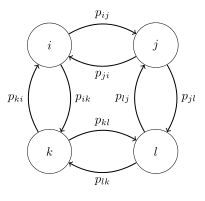Kolmogorov's criterion
In probability theory, Kolmogorov's criterion, named after Andrey Kolmogorov, is a theorem giving a necessary and sufficient condition for a Markov chain or continuous-time Markov chain to be stochastically identical to its time-reversed version.
Discrete-time Markov chains
The theorem states that a stationary Markov chain with transition matrix P is reversible if and only if its transition probabilities satisfy[1]
for all finite sequences of states
Here pij are components of the transition matrix P, and S is the state space of the chain.
Example

Consider this figure depicting a section of a Markov chain with states i, j, k and l and the corresponding transition probabilities. Here Kolmogorov's criterion implies that the product of probabilities when traversing through any closed loop must be equal, so the product around the loop i to j to l to k returning to i must be equal to the loop the other way round,
Continuous-time Markov chains
The theorem states that a continuous-time Markov chain with transition rate matrix Q is reversible if and only if its transition probabilities satisfy[1]
for all finite sequences of states
References
- 1 2 Kelly, Frank P. (1979). Reversibility and Stochastic Networks (PDF). Wiley, Chichester. pp. 21–25.